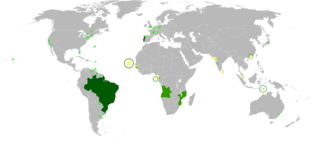
The Workers' Party is a democratic socialist political party in Brazil. Launched in 1980, it is one of the largest movements of Latin America. PT governed at the federal level in a coalition government with several other parties from 1 January 2003 to 31 August 2016. After the 2002 parliamentary election, PT became the largest party in the Chamber of Deputies and the largest in the Federal Senate for the first time ever. With the highest approval rating in the history of the country, President Luiz Inácio Lula da Silva is PT's most prominent member. His successor Dilma Rousseff, also a member of PT, took office on 1 January 2011.

The Socialist Party is a social-democratic political party in Argentina.

The Brazilian Socialist Party is a political party in Brazil. It was founded in 1947, before being abolished by the military regime in 1965 and re-organised in 1985 with the re-democratisation of Brazil. It elected six Governors in 2010, becoming the second largest party in number of state governments, behind only PSDB. In addition to that, it won 34 seats in the Chamber of Deputies and three seats in the Senate, besides having been a member of the For Brazil to Keep on Changing coalition, which elected Dilma Rousseff as President of Brazil.
The Party of the Reconstruction of the National Order was a nationalist political party in Brazil. Its electoral code was 56 and its colors were the traditional Brazilian green and yellow. It was founded in 1989 by the professor and politician Enéas Carneiro, who was the president of the party. Its political broadcasts during the pre-election campaigning periods became famous and distinct for the speed in which they were produced due to the very short time the party had available and also because of the use of Beethoven's Fifth Symphony as soundtrack.
The Social Christian Party is a conservative political party in Brazil.

Ciro Ferreira Gomes, often known monomyously as Ciro, is a Brazilian politician, lawyer, and academic, affiliated with the Democratic Labor Party (PDT). He was the PDT's presidential candidate in the 2018 Brazilian election.
In the context of Mexican politics, a national political association is a citizens' association intended to assist in the development of democratic life and the country's political culture, as well as being intended to create a better informed public opinion. They are similar to political parties; they used to receive public funding through the Federal Electoral Institute (IFE) for the promotion of their activities and ideas, but this was no longer the case after the 2008 political reform; after the 2014 political reform and the transformation of the IFE into INE, only political parties and independent candidates can receive public funding. APNs are not allowed to register candidates for election, though they can publicly support those of other political parties through association agreements and may only do so during federal elections. The creation of an APN is regarded as the first step towards the creation of a full-fledged political party.
The Ação Libertadora Nacional, was a Brazilian communist guerrilla movement formed in 1968 to stand against the military regime of 1964–1985. It was founded by Carlos Marighella after he was expelled from the Brazilian Communist Party.

The Brazilian Labour Renewal Party is a conservative Brazilian political party. It was founded in 1997 and its electoral number is 28. According to the party's official website, PRTB's main ideology is to establish an economic system based on participatory decision making as the primary economic mechanism for allocation in society.
Evolutionist Liberal Party of Ceará was a political party in the Ceará, Brazil. The party contested the October 14, 1934 elections to the Federal Chamber and the Ceará Constituent Assembly. The party nominated 11 candidates for the federal election and 30 candidates for the state assembly. One of the 30 state election candidates of the party was Adilia de Albuquerque Moraes, one of five female candidates in the fray. Albuquerque contested on the slogan "For the defence of women". None of its candidates were elected.

Denise Frossard Loschi is a judge and politician from Brazil. She studied law and served as a magistrate in Rio de Janeiro. She has been a law professor at the Getúlio Vargas Foundation. When she retired she started working for Transparency International.
The history of the socialist movement in Brazil is generally thought to trace back to the first half of the 19th century. There are documents evidencing the diffusion of socialist ideas since then, but these were, however, individual initiatives with no ability to form groups with actual political activism.
The 2009 Workers' Party Leadership Election was held on November 22 in order to renew all leaderships of the party. On December 6, a second round will be held to determine the new presidents of the party on the states of Minas Gerais, Minas Gerais, Maranhão, Rio Grande do Norte, and Amapá, and several municipalities. On the party's fourth direct election process, 1,3 million members were able to vote. The first round results were officially released on November 26, with former Petrobras president José Eduardo Dutra being elected the national president of the Workers' Party with over 58% of the vote.

Opinion polling in the Brazilian presidential election, 2010 began as soon as 2008. The main nationwide polling institutes are Datafolha, IBOPE, Vox Populi, and Sensus. From 1 January 2010 to the election day, as required by the electoral law, all polls were registered within the Supreme Electoral Court database.
Peru Wins was a leftist electoral alliance in Peru formed for the 2011 general election. It was dominated by the Peruvian Nationalist Party and led by successful presidential candidate Ollanta Humala.
Mozart Gurgel Valente Júnior was a Brazilian diplomat, Ambassador to the United States.
Sérgio Paulo Rouanet is a Brazilian diplomat, philosopher, essayist and scholar. He was the national Secretary of Culture between 1991 and 1992, and in his tenure he created the Lei de Incentivo à Cultura, a tax credit law for companies and citizens that sponsor cultural activities, which became known as Rouanet Law.








